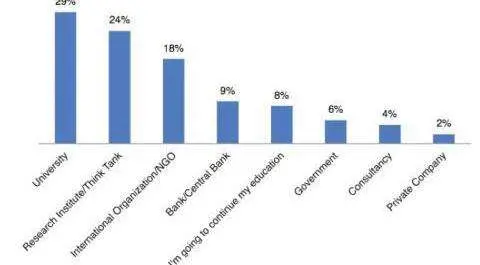The following article is archived and is no longer considered up-to-date. Please interpret its content in the context of the publishing date.

ARCHIVED
Top Employers for Economists in Germany, Switzerland and Austria
Read a summary using the INOMICS AI tool
In this report, which was just released on the INOMICS website, we offer a detailed look at the interests and experiences of economists in Germany, Switzerland and Austria. With the participation of over 300 economists from these three countries, we gathered a broad range of data in response to questions regarding fields of specialization, international mobility, job market preferences, top employers and many other issues. While nearly a third of survey respondents were PhD candidates, researchers made up another significant portion of participants (20%) and other respondents included professors, consultants, analysts, lecturers and others.
In this post we will offer you some highlights of the results we found, but please feel free to download the entire report in order to get the full picture.
For economists across Germany, Switzerland and Austria, a friendly working environment was considered to be of greatest importance when choosing a job, followed by flexible working hours and time to conduct research. Amongst student responses, universities, research institutes, think tanks and international organizations/NGOs were listed as the preferred type of future employer. A mere 6% of respondents said they would like to work for the government, and another combined 6% said they were looking to work for a private company or consultancy. The full breakdown of responses can be seen in the table below.
In contrast to the global trend, we found that only 30% of economists in Germany, Austria and Switzerland changed their field of specialization upon entering the labor force. Amongst these economists, Macroeconomics and Monetary Economics (12% of respondents) and International Economics (10% of respondents) were the most common fields of specialization.
We also found that foreign students and workers accounted for 54% of economists participating in our survey, which was a comparatively high percentage and indicated an interest amongst economists from other countries to work in this market.
To take a closer look at this data and much more, please download the full report here.
-
- Konferenz
- Posted 1 week ago
46th RSEP International Conference on Economics, Finance and Business
Between 17 Apr and 18 Apr in Paris, Frankreich
-
- Researcher / Analyst Job
- Posted 1 week ago
Researcher in Economic Theory and Policy, Behavioural Economics, Empirical Economics, or Econometrics (75 %; EG 13 TV-L)
At Düsseldorf Institute for Competition Economics (DICE) - University of Düsseldorf in Düsseldorf, Deutschland
-
- Postdoc Job
- Posted 5 days ago
Two-year Postdoctoral Research Position in Economics
At Department of Economics and Management, University of Padua in Padova, Italien














